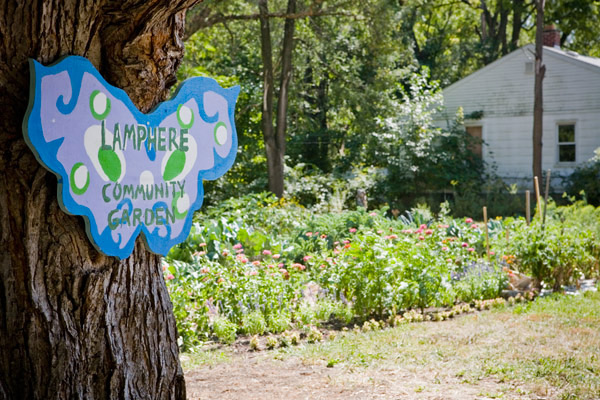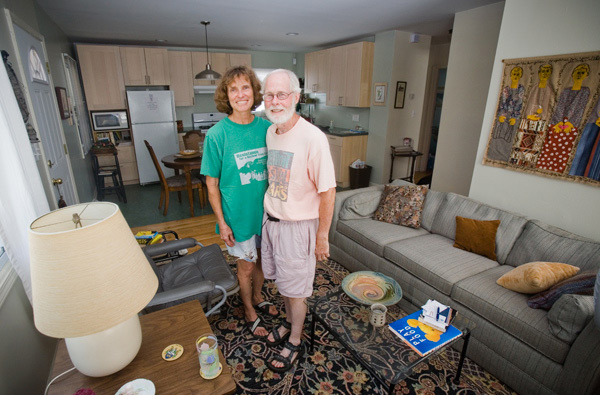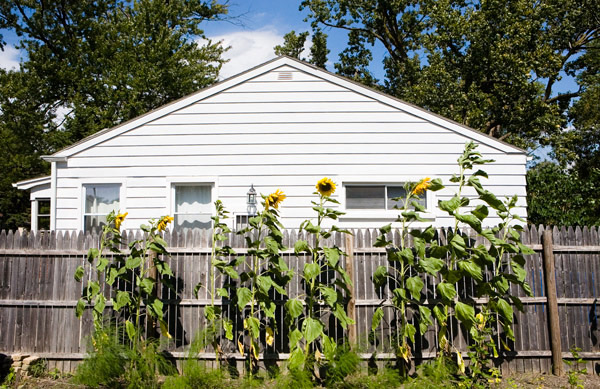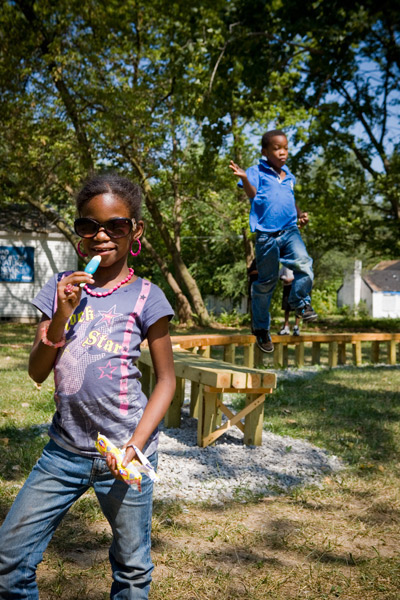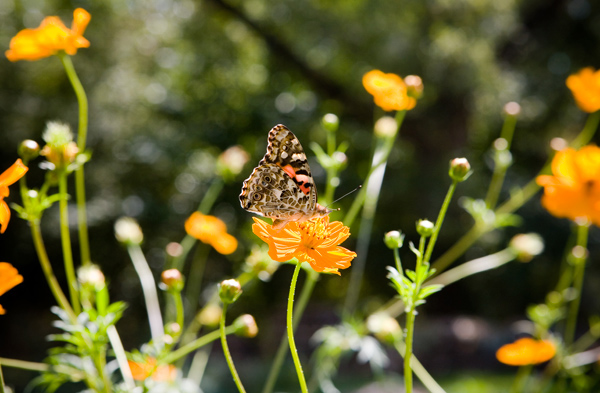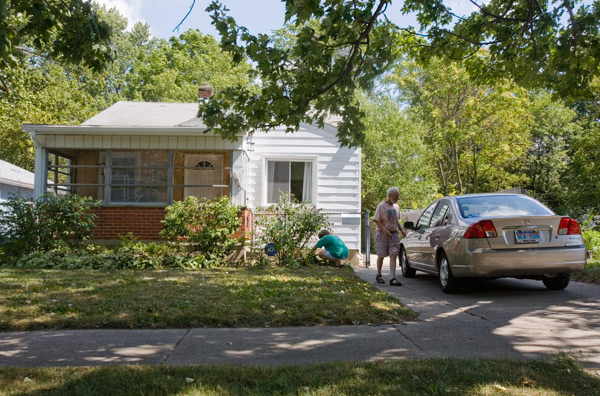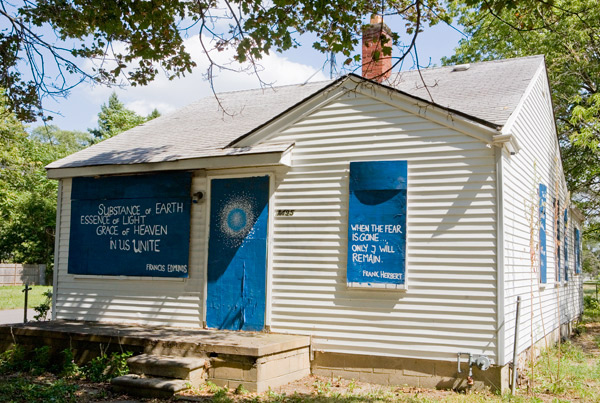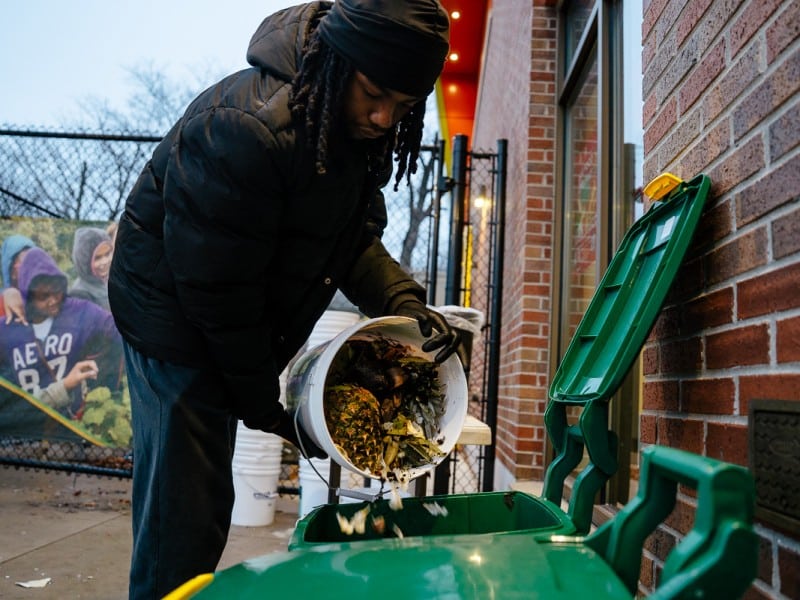The greening of Brightmoor: Urban farming goes northwest
Urban agriculture is more than just about farming. Much more. Detroiters Bill and Billie Hickey moved from Green Acres to the wide open spaces of Brightmoor, where they see an opportunity to cultivate community life and grow economic justice. Not to mention 24 varieties of fruits and vegetables. Dennis Archambault puts on his rubber boots and reports from the pumpkin patch.
For urban farmers Billie and Bill Hickey, it’s as much about growing community as growing vegetables and flowers. They grow together.
Formerly residents of the Green Acres neighborhood in Detroit, the Hickeys sold their house earlier this year and moved to Brightmoor, a spacious, blight-ridden district of northwest Detroit. They bought a 750-square foot wood frame house in disrepair and adopted vacant lots owned by the City of Detroit and Wayne County. Well into their first growing season, the Hickey farm is sprouting 24 varieties of vegetables and fruit, including kale, green beans, peppers, potatoes, carrots, rutabaga, tomatoes, leeks, broccoli, various herbs, watermelon, cantaloupe, and pumpkins, along with a line of multicolored zinnias, begonias and salvias. They planted two plum trees, asparagus, and raspberry bushes for future harvests.
Billie learned about urban farming through years of backyard gardening, classes through the Garden Resource Program, and was part of a group that developed the Gloryland Community Garden near Gesu Parish, in Detroit’s University District. Recently retired from the Michigan Roundtable for Diversity and Inclusion, Billie believes that urban farming is about “food security.”
“There are no grocery stores within walking distance in most Detroit neighborhoods. Access to good, healthy food is the issue in food deserts. Many of my African-American gardener friends describe growing their own food as freedom and resistance.”
John Mogk, a Wayne State University Law professor, says that “no activity has greater potential for realizing economic justice than urban agriculture if city land is made available on a widespread basis to residents to help meet their nutritional and economic needs.” The law school recently completed a study advocating for urban farming as a way to reduce vacant land and the cost of maintaining it, provide jobs, and increase the availability of wholesome, inexpensive food for residents.
“Detroit is widely accepted as the national leader in urban agriculture,” says Ashley Atkinson, program director with the Greening of Detroit’s Garden Resource Program. There are 1,200 urban farms and community gardens in Detroit. About 250 are community gardens and nearly 40 are production/profit focused market gardens. Perhaps the most notable large-scale urban farm has been proposed by Detroit businessman John Hantz, who hopes to develop a 110-acre farm on the city’s east side.
“We really believe in community”
The Hickeys came to Brightmoor at the invitation of Riet Schumack, a pioneer who has developed several urban farm plots in Brightmoor. Billie and Bill, a retired lawyer from Blue Cross Blue Shield of Michigan, decided to join the growing urban farm community. The Hickeys gave up a nice house in a comfortable neighborhood, with longtime good neighbors. “It was hard to say goodbye,” Billie recalls. “We really believe in community. To make the choice to live in a different community is very hard. Many of the folks who lived on our street lived in their houses a long time.” They still maintain contact with the University District community through Gesu Church and the Gloryland Community Garden.
“There’s something in our society in which typically people have moved up throughout their lives,” says Billie. “When you’re retired you’re feeling comfortable and life is good. Why would you want to downsize when it means changing so many things about the way that you live? For us, it was time to align more with the values that are important to us.
Working the soil can be a calling for all ages, she says. Recently, a younger couple from Hamtramck established their homestead a block from the Hickeys. Prospective urban farmers “have to look at what is important to them and whether living this kind of lifestyle is what they felt called to. “In urban farming, you’ll never be rich,” Billie says. “You have to decide on a lifestyle in which you live out your values in different ways. Money can’t be the most important thing.”
It’s not a “leave it all behind” proposition, however. Urban farming can augment a more traditional lifestyle.
“It can be done on different levels,” Bill says. “There are a lot of people gardening. That doesn’t mean that you have to make an enormous shift in how you spend your time.” Many people work other jobs and cultivate their garden during their off hours or volunteer at another community garden. “There are many ways to do it. You don’t have to decide to farm two or three vacant lots. There’s plenty of opportunity for people of all ages and all abilities to put their fingernails into the ground.”
“Wide open spaces, full of living things and possibility”
Community farms may not yield large profits, but there is some money to be made. Young people in Brightmoor earned $2,000 selling their produce last summer. The Hickeys are considering selling from a stand at the street curb, and giving produce away to people who can’t afford to buy it. “We could sell with ‘Grown in Detroit,’ which sells at Eastern Market and Wayne State,” says Billie. “But the idea of that market, which operates through the Detroit Agricultural Network, is to provide income for the farmers. What we’re trying to do here is to provide food for anyone who needs it.
“If we sell it here, we wouldn’t have to charge organic vegetable prices. We can just charge what someone will pay. Organic is expensive. I’ve thought about putting a sign on a tree telling people what we have available right now. They could help us pick it.”
Unlike a traditional large farm where the farm family lives at some distance from their neighbors, the urban farmer lives on the same block and is mutually reliant on their neighbors for security and social support. For some, Brightmoor’s extensive vacant lots may appear vacuous. For Billie, it’s “wide open spaces, full of living things and possibility.”
Urban farm districts like Brightmoor contribute to making Detroit more vital, she says. “I think Detroiters have to feel good about where they live. Anything we can do together to make where we live more beautiful, more engaging and more communal is going to make the city a better and stronger place to live.”
Bill and Billie have a tradition of adopting words on New Year’s Eve which they reflect on throughout the year. This year it is “resilience — the resilience of the land, the resilience of the people, the resilience of Detroit,” Bill says. “We see it everywhere here. It’s what makes this city and this neighborhood we now call home such an exciting and vibrant place to live.”
Brightmoor is an intriguing area of Detroit that is morphing into a small town through creative reuse. Vacant and abandoned space serves as a canvas for people looking for inspiration in the transformation of the vast, dense urban grid of Detroit to spacious, greener urban sub-communities. For example, Johannes Matthiessen, a German landscape architect and artist, created a long spiral bench surrounding an old tree ravaged by a storm two lots from the Hickey home. He believes that his art helps capture energy through a swirl of human presence and applied design. Matthiessen drew attention to the severed section of the tree by painting it blue. He plans to install a mobile to capture breeze through the tree.
While an aesthetic departure from growing greens, in a sense, artistic creativity can also be defined as growth. This holistic quality hasn’t been lost on Bill Hickey. “The ground is not dead,” he says. “It has been beaten down, but it can be invigorated.” On one level, he speaks literally of the ground he’s cultivating. But on a community level, his comments address Brightmoor, and to a greater extent, a growing potential for nurturing new life in Detroit as well.
Dennis Archambault is a Detroit-based freelance writer and longtime contributor to Model D.
All photographs © Marvin Shaouni Photography
Contact Marvin here
Photo:
The Hickeys’ community garden in Brightmoor
The Hickeys’ downsized
Sunflowers brighten up a vacant lot next to the Hickeys’ home
Neighborhood youth play in Seed Park, one of many pocket parks in Brightmoor
Lamphere Community Garden brings life to Brightmoor
They Hickeys enjoy a simpler life
An abandoned home down the street from the Hickeys’ is used as a canvas for inspiration
